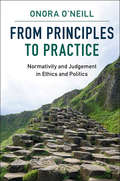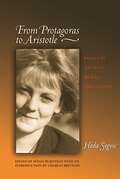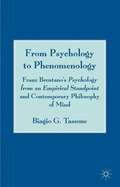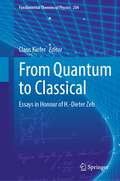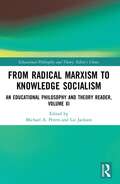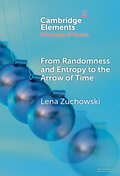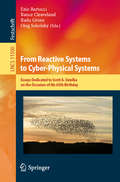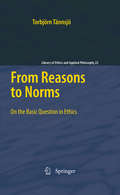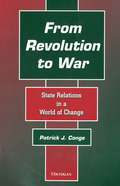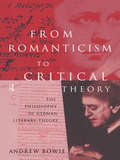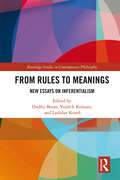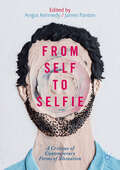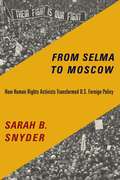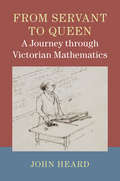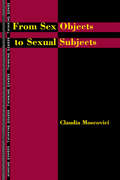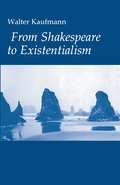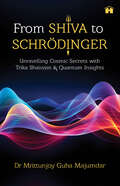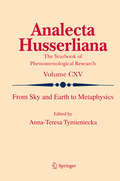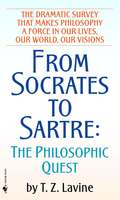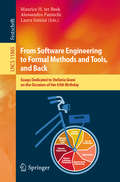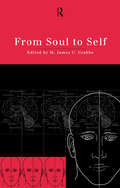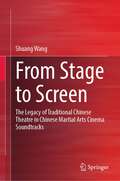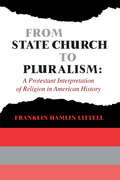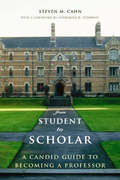- Table View
- List View
From Principles to Practice: Normativity and Judgement in Ethics and Politics
by Onora O'NeillKnowledge aims to fit the world, and action to change it. In this collection of essays, Onora O'Neill explores the relationship between these concepts and shows that principles are not enough for ethical thought or action: we also need to understand how practical judgement identifies ways of enacting them and of changing the way things are. Both ethical and technical judgement are supported, she contends, by bringing to bear multiple considerations, ranging from ethical principles to real-world constraints, and while we will never find practical algorithms - let alone ethical algorithms - that resolve moral and political issues, good practical judgement can bring abstract principles to bear in situations that call for action. Her essays thus challenge claims that all inquiry must use either the empirical methods of scientific inquiry or the interpretive methods of the humanities. They will appeal to a range of readers in moral and political philosophy.
From Protagoras to Aristotle: Essays in Ancient Moral Philosophy
by Heda SegvicThis is a collection of the late Heda Segvic's papers in ancient moral philosophy. At the time of her death at age forty-five in 2003, Segvic had already established herself as an important figure in ancient philosophy, making bold new arguments about the nature of Socratic intellectualism and the intellectual influences that shaped Aristotle's ideas. Segvic had been working for some time on a monograph on practical knowledge that would interpret Aristotle's ethical theory as a response to Protagoras. The essays collected here are those on which her reputation rests, including some that were intended to form the backbone of her projected monograph. The papers range from a literary study of Homer's influence on Plato's Protagoras to analytic studies of Aristotle's metaphysics and his ideas about deliberation. Most of the papers reflect directly or indirectly Segvic's idea that both Socrates' and Aristotle's universalism and objectivism in ethics could be traced back to their opposition to Protagorean relativism. The book represents the considerable achievements of one of the most talented scholars of ancient philosophy of her generation.
From Psychology to Phenomenology
by Biagio G. TassoneAlthough highly influential, Brentano's doctrines from Psychology from an Empirical Standpoint were taken up and changed by his students and subsequent thinkers. Tassone's study of this important text offers readers a better understanding of PES and outlines its ongoing relevance for contemporary philosophy of mind.
From Quantum to Classical: Essays in Honour of H.-Dieter Zeh (Fundamental Theories of Physics #204)
by Claus KieferQuantum theory is at the foundation of the physical description of our world. One of the people who contributed significantly to our conceptual understanding of this theory was Heinz-Dieter Zeh (1932-2018). He was the pioneer of the process of decoherence, through which the classical appearance of our world can be understood. This volume presents a collection of essays dedicated to his memory, written by distinguished scientists and scholars. They cover all aspects of the interpretation of quantum theory in general and the quantum-to-classical transition in particular. This volume provides illuminating reading to anyone seeking a deep understanding of quantum theory and its relevance to the foundations of physics.
From Radical Marxism to Knowledge Socialism: An Educational Philosophy and Theory Reader, Volume XI (Educational Philosophy and Theory: Editor’s Choice)
by Michael A. PetersThis volume examines the place of Marxist theory in the history of the journal Educational Philosophy and Theory, primarily through the selection and exploration of typical and significant articles exploring Marxist-related themes in the journal over time. The title, From Radical Marxism to Knowledge Socialism, reflects this historical approach. In the 1960s and 1970s, Marxism was considered to be a radical, extreme ‘political’ theory, while western liberalism and a free-market economy were largely taken for granted as natural phenomena, in western philosophy of education and in the journal. More recently, educational theorists have begun to explore trends related to the neoliberal age. Paradoxically, such trends include the move toward knowledge socialism, which decenters the normative presuppositions of knowledge capitalism as the latest iteration of western liberalism. The volume begins with an introductory chapter that examines the history of Marxism in western philosophy and philosophy of education. The rest of the book features works selected from the journal that further illustrate the evolution of Marxist theoretical perspectives in the field over time. This collection thus gives a sense of the range and extent of Marxist-inspired thinking in educational philosophy and theory. This book will be of interest to students and scholars of educational philosophy and theory and others who are interested in exploring in depth the evolution of key themes in this field over time, including liberalism, ideology, Marxism, neoliberalism, knowledge construction, capitalist and socialist schooling, and other aspects of economic analysis in education.
From Randomness and Entropy to the Arrow of Time (Elements in the Philosophy of Physics)
by Lena ZuchowskiThe Element reconstructs, analyses and compares different derivational routes to a grounding of the Arrow of Time in entropy. It also evaluates the link between entropy and visible disorder, and the related claim of an alignment of the Arrow of Time with a development from order to visible disorder. The Element identifies three different entropy-groundings for the Arrow of Time: (i) the Empirical Arrow of Time, (ii) the Universal Statistical Arrow of Time, and (iii) the Local Statistical Arrow of Time. The Element will also demonstrate that it is unlikely that high entropy states will always coincide with visible disorder. Therefore, it will dispute that there is a strong link between the Arrow of Time and visible disorder.
From Reactive Systems to Cyber-Physical Systems: Essays Dedicated to Scott A. Smolka on the Occasion of His 65th Birthday (Lecture Notes in Computer Science #11500)
by Ezio Bartocci Oleg Sokolsky Rance Cleaveland Radu GrosuThis Festschrift is in honor of Scott A. Smolka, Professor in the Stony Brook University, USA, on the occasion of his 65th birthday. Scott A. Smolka made fundamental research contributions in a number of areas, including process algebra, model checking, probabilistic processes, runtime verification, and the modeling and analysis of cardiac cells, neural circuits and flocking behaviors. He is perhaps best known for the algorithm he and Paris Kanellakis invented for checking bi-simulation. The title of this volume From Reactive Systems to Cyber-Physical Systems reflects Scott's main research focus throughout his career. It contains the papers written by his closest friends and collaborators. The contributions cover a wide spectrum of the topics related to Scott's research scientific interests, including model repair for probabilistic systems, runtime verification, model checking, cardiac dynamics simulation and machine learning.
From Reasons to Norms
by Torbjörn TännsjöThis book originated from a discussion between the author, Derek Parfit and Wlodek Rabinowicz, and further developed in correspondence and intense discussions with Wlodek Rabinowics and John Broome. The author disputes the recent trend in metaethics that focuses on reasons rather than norms. The reader is invited to take a new look at the traditional metaethical questions of moral semantics, ontology, and epistemology. The author mainly concerns himself with particular aspects of these problems: Which are the problems of morality? Are there many different moral questions, or, do they all, in the final analysis, reduce to one? The bold claim made in this book is that there is just one: What ought to be done? Moreover, there is just one source of normativity, just one kind of 'ought'-question, which lends itself to an objectively correct and authoritative answer.
From Revolution to War: State Relations in a World of Change
by Patrick J. CongeIn the history of international relations, few events command as much attention as revolution and war. Over the centuries, revolutionary transformations have produced some of the most ruinous and bloody wars. Nevertheless, the breakdown of peace in time of revolution is poorly understood. Patrick Conge offers a groundbreaking study of the relationship between war and revolution. How can we best understand the effect of revolutionary transformations on the politics of war and peace? Conge argues that it is only by bringing in, first, the organizational capacity of revolutionary regimes to extract resources and convert them into military strength and, second, the power of transformative ideas to transcend national boundaries and undermine the ability of opposing regimes to compromise that we are best able to understand the effect of revolution on the origins and persistence of war. By incorporating such key elements, this book provides a new, more comprehensive explanation of the relationship between revolution, war, and peace. Conditions that lead to and sustain wars in general are identified and placed in the light of revolutionary transformations. Once the argument is presented, historical case studies are used to test its plausibility. Conge demonstrates the importance of the effect of revolutionary organization and ideas on the outcome of conflicts. Political scientists, historians, sociologists, and the general reader interested in the politics of war and peace in revolutionary times are given new perspectives on the relationship between revolution and war as well as on the implications of political organization for military power and the process of consolidation of new regimes.
From Romanticism to Critical Theory: The Philosophy of German Literary Theory
by Andrew BowieFrom Romanticism to Critical Theory explores the philosophical origins of literary theory via the tradition of German philosophy that began with the Romantic reaction to Kant. It traces the continuation of the Romantic tradition of Novalis, Friedrich Schlegel and Schleiermacher, in Heidegger's approaches to art and thruth, and in the Critical Theory of Benjamin and Adorno.Andrew Bowie argues, against many current assumptions, that the key aspect of literary theory is not the demonstration of how meaning can be deconstructed, but rather the relevation of how questions of language and literature change modern philosophical conceptions of thruth. He shows how the dialogue between literary theory, hermeneutics and analytical philosophy can profit from a re-examination of the understanding of language, thruth and literature in modern German philosophy.From Romanticism to Critical Theory will provide a vital new introduction to central theoretical questions for students of philosophy, literature, German studies, cultural and social theory.
From Rules to Meanings: New Essays on Inferentialism (Routledge Studies in Contemporary Philosophy)
by Ondřej Beran Vojtěch Kolman Ladislav KoreňInferentialism is a philosophical approach premised on the claim that an item of language (or thought) acquires meaning (or content) in virtue of being embedded in an intricate set of social practices normatively governed by inferential rules. Inferentialism found its paradigmatic formulation in Robert Brandom’s landmark book Making it Explicit, and over the last two decades it has established itself as one of the leading research programs in the philosophy of language and the philosophy of logic. While Brandom’s version of inferentialism has received wide attention in the philosophical literature, thinkers friendly to inferentialism have proposed and developed new lines of inquiry that merit wider recognition and critical appraisal. From Rules to Meaning brings together new essays that systematically develop, compare, assess and critically react to some of the most pertinent recent trends in inferentialism. The book’s four thematic sections seek to apply inferentialism to a number of core issues, including the nature of meaning and content, reconstructing semantics, rule-oriented models and explanations of social practices and inferentialism’s historical influence and dialogue with other philosophical traditions. With contributions from a number of distinguished philosophers—including Robert Brandom and Jaroslav Peregrin—this volume is a major contribution to the philosophical literature on the foundations of logic and language.
From Self to Selfie: A Critique of Contemporary Forms of Alienation
by Angus Kennedy James PantonThis edited collection charts the rise and the fall of the self, from its emergence as an autonomous agent during the Enlightenment, to the modern-day selfie self, whose existence is realised only through continuous external validation. Tracing the trajectory of selfhood in its historical development - from the Reformation onwards - the authors introduce the classic liberal account of the self, based on ideas of freedom and autonomy, that dominated Enlightenment discourse. Subsequent chapters explore whether this traditional notion has been eclipsed by new, more rigid, categories of identity, that alienate the self from itself and its possibilities: what I am, it seems, has become more important than what I might make of myself. These changing dynamics of selfhood – the transition From Self to Selfie - reveal not only the peculiar ways in which selfhood is problematized in contemporary society, but equally the tragic fragility of the selfie, in the absence of any social authority that could give it some security.
From Selma to Moscow: How Human Rights Activists Transformed U.S. Foreign Policy
by Sarah B. SnyderThe 1960s marked a transformation of human rights activism in the United States. At a time of increased concern for the rights of their fellow citizens—civil and political rights, as well as the social and economic rights that Great Society programs sought to secure—many Americans saw inconsistencies between domestic and foreign policy and advocated for a new approach. The activism that arose from the upheavals of the 1960s fundamentally altered U.S. foreign policy—yet previous accounts have often overlooked its crucial role.In From Selma to Moscow, Sarah B. Snyder traces the influence of human rights activists and advances a new interpretation of U.S. foreign policy in the “long 1960s.” She shows how transnational connections and social movements spurred American activism that achieved legislation that curbed military and economic assistance to repressive governments, created institutions to monitor human rights around the world, and enshrined human rights in U.S. foreign policy making for years to come. Snyder analyzes how Americans responded to repression in the Soviet Union, racial discrimination in Southern Rhodesia, authoritarianism in South Korea, and coups in Greece and Chile. By highlighting the importance of nonstate and lower-level actors, Snyder shows how this activism established the networks and tactics critical to the institutionalization of human rights. A major work of international and transnational history, From Selma to Moscow reshapes our understanding of the role of human rights activism in transforming U.S. foreign policy in the 1960s and 1970s and highlights timely lessons for those seeking to promote a policy agenda resisted by the White House.
From Servant to Queen: A Journey through Victorian Mathematics
by John HeardWith a few notable exceptions, pure mathematics in Britain at the beginning of the nineteenth century was mainly a recreation for amateurs. Drawing on primary sources, John Heard provides an engaging account of the process by which it rose to become an academic discipline of repute which by the First World War was led by G. H. Hardy, and supported by the internationally-respected London Mathematical Society. In chronicling that rise, this book describes key contributions and the social environment in which mathematicians operated, using contemporary commentary where appropriate. No mathematical knowledge is required, and readers with a wide range of interests and backgrounds will find much to enjoy here. The material is presented from an impartial point of view, and provides full references to help any researchers who want to dig deeper into the original sources. The result is a unique insight into the world of Victorian mathematics and science.
From Sex Objects to Sexual Subjects (Thinking Gender Ser.)
by Claudia MoscoviciFrom Sex Objects to Sexual Subjects traces some of the ruptures and continuities between the eighteenth-century masculinist formulations of subjectivity elaborated by Rousseau, Diderot and Kant and the contemporary postmodern and feminist critiques of the universal subject--meaning the self viewed as an abstract individual who exercises an impartial and rational (political) judgment that is idential to other similarly defined individuals--developed by Luce Irigaray, Francois Lyotard, Jacques Derrida, Jurgen Habermas, Nancy Fraser, Judith Butler and Michel Foucault. In her work, Moscovici brings together the wide-ranging discussion of subjectivity with debates about public discourse. In so doing she attempts a synthesis between the two discussions that have recently engaged feminist theorists and others.
From Shakespeare to Existentialism: Essays on Shakespeare and Goethe; Hegel and Kierkegaard; Nietzsche, Rilke and Freud; Jaspers, Heidegger, and Toynbee
by Walter A. KaufmannA companion volume to his Critique of Religion and Philosophy, this book offers Walter Kaufmann's critical interpretations of some of the great minds in Western philosophy, religion, and literature.
From Shiva to Schrödinger
by Mrittunjoy Guha MajumdarFrom Shiva to Schrödinger offers a revelatory journey into the teachings of Trika Shaivism and their remarkable alignment with the discoveries of modern quantum physics. This thought-provoking book demonstrates how the profound insights of this ancient spiritual tradition predate and parallel the concepts emerging from the cutting-edge world of quantum mechanics.With clarity and depth, the author illustrates how the Trika Shaivism philosophy anticipated many of the important discoveries that modern physicists are just beginning to comprehend. He delves into the heart of both ancient spirituality and contemporary science to showcase how concepts like non-duality, the interconnectedness of all existence, and the illusion of separation resonate powerfully with the latest scientific theories of entanglement, quantum superposition, and the observer effect.All in all, From Shiva to Schrödinger is not just a bridge between ancient wisdom and contemporary insights; it is a beacon illuminating the path to a deeper understanding of our universe and ourselves. So, whether you are drawn to spiritual inquiry or scientific discovery, this book offers a transformative perspective that will enrich your contemporary quest for knowledge.
From Sky and Earth to Metaphysics
by Anna-Teresa TymienieckaThis is an exceptional volume which expands upon the World Phenomenology Institute's recent research: the study of the beautiful intertwining of the skies and the cosmos with the human pursuits of philosophy, literature and the arts The relationship of humans to the cosmos is examined through the exploration of phenomenology, metaphysics and the arts The authors of this volume write on a variety of topics which all seek to open the reader's eyes to the relationship of humans and our perception of our place in the cosmos This volume offers a framework in which to present a rich panorama; a variety of perspectives illustrating how the perception of the interplay between human beings and the celestial realm advances in common experience and worldviews. This attempt to uncover our cosmic position is a great and worthwhile intellectual challenge. Philosophy as well as literature and the arts are nourished by this human quest for knowledge and understanding.
From Socrates to Sartre: The Philosophic Quest
by T. Z. LavineA challenging new look at the great thinkers whose ides have shaped our civilizationFrom Socrates to Sartre presents a rousing and readable introduction to the lives, and times of the great philosophers. This thought-provoking book takes us from the inception of Western society in Plato's Athens to today when the commanding power of Marxism has captured one third of the world. T. Z. Lavine, Elton Professor of Philosophy at George Washington University, makes philosophy come alive with astonishing clarity to give us a deeper, more meaningful understanding of ourselves and our times.From Socrates to Sartre discusses Western philosophers in terms of the historical and intellectual environment which influenced them, and it connects their lasting ideas to the public and private choices we face in America today.From Socrates to Sartre formed the basis of from the PBS television series of the same name.From the Paperback edition.
From Software Engineering to Formal Methods and Tools, and Back: Essays Dedicated to Stefania Gnesi on the Occasion of Her 65th Birthday (Lecture Notes in Computer Science #11865)
by Alessandro Fantechi Maurice H. ter Beek Laura SeminiThis volume was published in honor of Stefania Gnesi’s 65th birthday. The Festschrift volume contains 32 papers written by close collaborators and friends of Stefania and was presented to her on October 8, 2019 one-day colloquium held in Porto, Portugal, The Festschrift consists of eight sections, seven of which reflect the main research areas to which Stefania has contributed. Following a survey of Stefania's legacy in research and a homage by her thesis supervisor, these seven sections are ordered according to Stefania's life cycle in research, from software engineering to formal methods and tools, and back: Software Engineering; Formal Methods and Tools; Requirements Engineering; Natural Language Processing; Software Product Lines; Formal Verification; and Applications.
From Soul to Self
by M. James C. CrabbeFrom Soul to Self takes the reader on a fascinating journey through philosophy, theology, religious studies, and physiological sciences. Each of the essays, drawn from a number of different fields, focuses on the idea of the soul and of our sense of ourselves.A stellar line-up of authors explore the relationship between a variety of ideas that have arisen in philosophy, religion and science, each idea seeking to explain why we think that we as individuals are somehow distinct and unique.Contributors: Richard Sorabji, Anthony Kenny, Kallistos Ware, Peter Riviere, Gary Matthews, Susan Greenfield, Galen Strawson
From Stage to Screen: The Legacy of Traditional Chinese Theatre in Chinese Martial Arts Cinema Soundtracks
by Shuang WangChinese martial arts cinema is held to be a synthesis drawing on artistic conventions of traditional Chinese theatre. Film sound and music perform as the legitimate heirs of some of the aesthetic ideas and norms of traditional Chinese theatre. This book critically examines the history of this under-explored field of inquiry from a theoretically comparative perspective, demonstrating that the musical codes drawn from traditional theatre are a constantly changing component integral to Chinese martial arts cinema. It explores the interaction between traditional Chinese theatre and Chinese martial arts cinema in how the musical codes of the former have shaped the aesthetics of the latter uniquely. This departs from conventional existing studies that focus on “adaptation.” The book’s historical and theoretical approach connects film, theatre and music, and re-defines the status of distinctive domains of filmic expression, grounding theatre as the pivot – or “hinge” – of film aesthetics. The book proffers this unique angle of research to rethink and re-imagine film sound and audiovisual synchronisation. Primarily intended for scholars in Chinese cinema, film music, Chinese theatre and visual culture, this monograph also presents introductory and comprehensive material for undergraduate and graduate-level courses in film and media studies, film music, Chinese cinema, and Chinese theatre.
From State Church to Pluralism: A Protestant Interpretation of Religion in American History
by Franklin LittellFor most of our history, American religious life has been dominated by a view of church history in which we appear as mere deposits of European religious culture. In fact, however, the freedom of Americans to choose without penalty to join any religious body or none at all is new in human history. This book is an effort to understand and interpret how we arrived at our present situation and, in doing so, to clarify many cultural, social and political issues.
From Stoicism to Platonism
by Engberg-Pedersen TroelsFrom Stoicism to Platonism describes the change in philosophy from around 100 BCE, when monistic Stoicism was the strongest dogmatic school in philosophy, to around 100 CE, when dualistic Platonism began to gain the upper hand - with huge consequences for all later Western philosophy and for Christianity. It is distinguished by querying traditional categories like 'eclecticism' and 'harmonization' as means of describing the period. Instead, it highlights different strategies of 'appropriation' of one school's doctrines by philosophers from the other school, with all philosophers being highly conscious of their own identity. The book also sets out to break down the traditional boundaries between, on the one hand, the study of Greco-Roman philosophy in the period and, on the other hand, that of contemporary Hellenistic Jewish and early Christian writings with a philosophical profile. In these ways, the book opens up an immensely fruitful period in the history of philosophy.
From Student to Scholar
by Steven M. Cahn Catharine R. StimpsonSteven M. Cahn's advice on the professorial life covers an extensive range of critical issues: how to plan, complete, and defend a dissertation; how to navigate a job interview; how to improve teaching performance; how to prepare and publish research; how to develop a professional network; and how to garner support for tenure. He deals with such hurdles as a difficult dissertation advisor, problematic colleagues, and the pressures of the tenure clock. Whether you are beginning graduate study, hoping to secure an academic position, or striving to build a professorial career, Cahn's insights are invaluable to traversing the thickets of academia.
